|
G7
- FUTURE
SEAS OCEANS WORKING GROUP
ABOUT -
CONTACTS - FOUNDATION -
HOME - A-Z INDEX
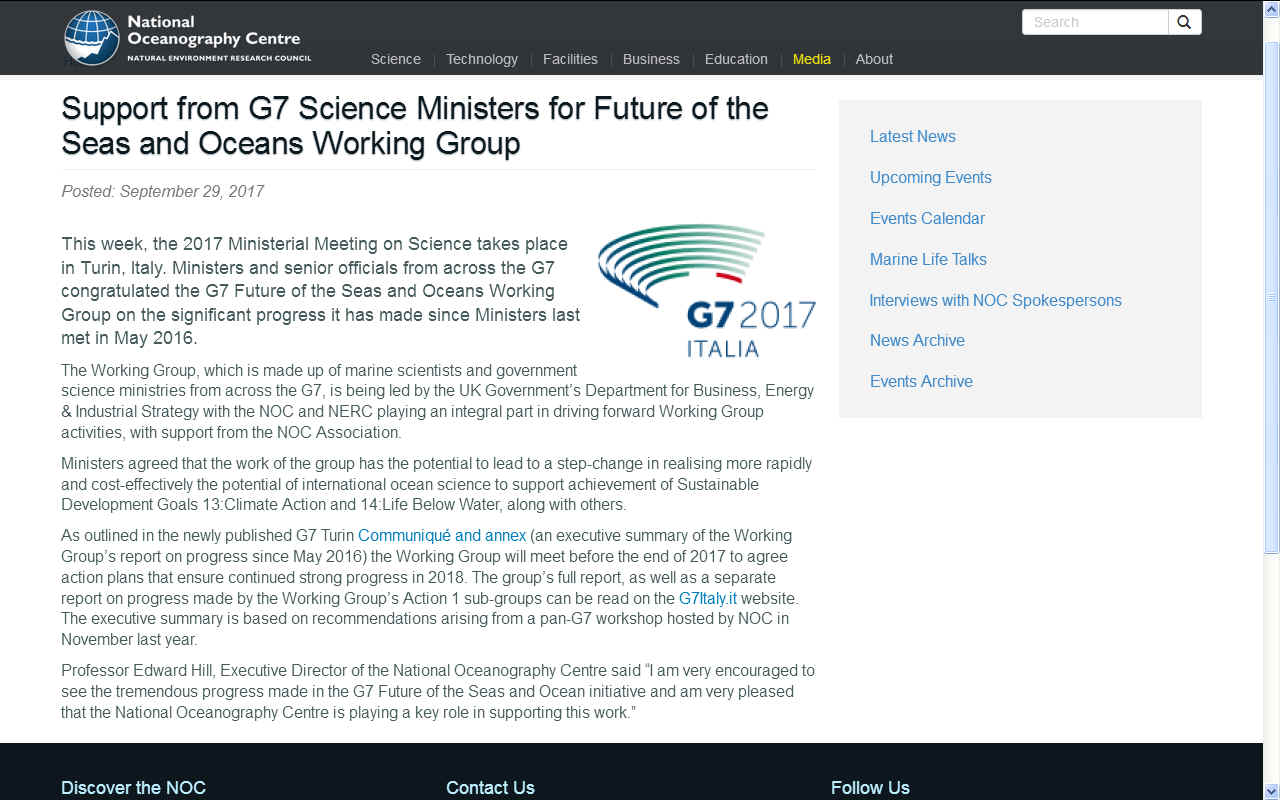
THE
G7 - The Group of Seven (G7) is an informal grouping of seven of the world’s advanced economies consisting of Canada, France, Germany, Italy, Japan, the United Kingdom, and the United States. The forum offers an opportunity for G7 Leaders, Ministers and policy makers to come together each year to build consensus and set trends around some of today’s most challenging global issues.
The European Union (EU) was first invited to attend the G7 in 1977 and the President of the
European Commission has attended all of its sessions since 1981. Both the President of the European Council and the President of the European Commission represent the EU at G7 summits.
The
G7 Ministerial Meeting on Science ended
on the 30th September in Turin. The Ministers addressed several topics during the working sessions, in particular the training of researchers, the funding of research and the implementation of synergies to create global research infrastructures.
The G7 Science is the second of the three ministerial meetings focused on
innovation, scheduled until September 30. The meeting of the ICT and Industry Ministers took place on 25 and 26 September and the Ministerial Meeting on Labor will be held on 29 and 30 September.
The Ministers of Science and Research met at Venaria Reale (Turin) on September 27 and 28, 2017 for the G7 Science, which, together with the Ministerial meetings of Industry and Labour, were part of the G7 Innovation Week, organized by the Italian G7 Presidency and dedicated to the global challenges posed by the "Next Production Revolution".
The discussion of the G7 Science was articulated in three sessions. The first was dedicated to the tools to ensure that the training of researchers, with particular attention to women and young people, includes the formal and informal skills required by the new technological paradigm.
The second session addressed the policy and financing system for an inclusive and responsible research. Discussions were focused on how to adapt existing tools and policies by stimulating demand for innovation and new technologies and by redefining public and private intervention. The central issue was to ensure that the benefits generated by the investments contribute to sustainable development goals (SDGs), by increasing the social impact of research policies and by emphasizing the social responsibility of research activities.
The last session was devoted to discussing how to increase synergies to create global research infrastructures, including e-infrastructures, which make results of the research activity accessible and reusable in all fields.
THE
G7 FOCUSES ON INNOVATION IN TURIN
The city of Turin in the Piedmont region of Italy is to host the first of the three G7 Ministerial Meetings dedicated to Innovation
- specifically to Industry/ICT, Science, and Labor
- on September 25–26. The agenda of the meeting includes the transformation enabled by digital technologies, advanced robotics and data-driven production processes.
“The Next Production Revolution (NPR)” as defined by the Organization for Economic Cooperation and Development (OECD), is already in place, empowered by developments in robotics, the industrial application of artificial intelligence, the diffusion of 3D printing technologies and real-time big data analytics. The transformations related to the diffusion of Industry 4.0 will have a deep impact on society and on the labor market in the coming years: while the NPR is a crucial opportunity to modernize production, it could lead to negative effects on employment levels if not adequately planned and guided.
The G7 countries have adopted strategies to address NPR’s complexity challenges, such as the “Industrie 4.0” plan in Germany, “Industrie du Futur” in France, “Society 5.0”, “Connected Industries” and “IoT Comprehensive Strategy” in Japan, “Innovation and Skills Plan” in Canada, as well as the “Digital and Industrial Strategies” introduced in the United Kingdom. A similar path was undertaken by the European Union, which in April 2016 launched the Industrial Innovation Plan called “Digitising European Industry
- Reaping the full benefits of a Digital Single Market”.
With regard to Italy, on September 21, 2016 the Ministry of Economic Development presented the Industry 4.0 National Plan, with the aim of spreading the benefits of the New Industrial Revolution. The Plan provides Italian companies with a public investment of 13 billion euro, with considerable tax benefits, to stimulate private investment in assets with high technological components. The Plan aims to transform the Italian industrial sector, supporting the widespread diffusion of enabling technologies, such as co-bots (collaborative robots), interconnection between machines, augmented reality, 3D printers and Big Data Analytics Software.
The issue of culture and digital skills is a key point in the Plan, as Industry 4.0 is a new production paradigm based on innovative governance and management models. For this reason, incentives to significantly increase the investments in research and development have been introduced.
The initiatives undertaken by the G7 countries aspire to be considered best practices, to be shared in order to fuel a debate aimed at addressing the challenges posed by the Industry 4.0 in a coordinated way. This theme will therefore play a central role in the ICT/Industry Ministerial Meeting, whose three key words are: inclusion, openness and security. Inclusion means the ability to support Small and Medium-sized Enterprises, which represents at least 70% of the industrial sector of many G7 countries, in their digitization processes. Governments will have to support the transition of SMEs and foster the growth of ecosystems where innovation can prosper, even in cooperation with major companies. The keyword openness is related to the free flow of data and information, interoperability of systems, access to enabling digital infrastructures and, above all, the possibility of sharing the benefits of artificial intelligence, for the well-being of all citizens.Finally, security is another key prerequisite in an ecosystem where companies are increasingly threatened by ICT risks. Security is related also to intellectual property rights, which continue to suffer violations causing economic and social losses.
International cooperation is crucial to ensure a responsive and balanced spreading of the NPR in G7 countries, by defining common policies and strategies.
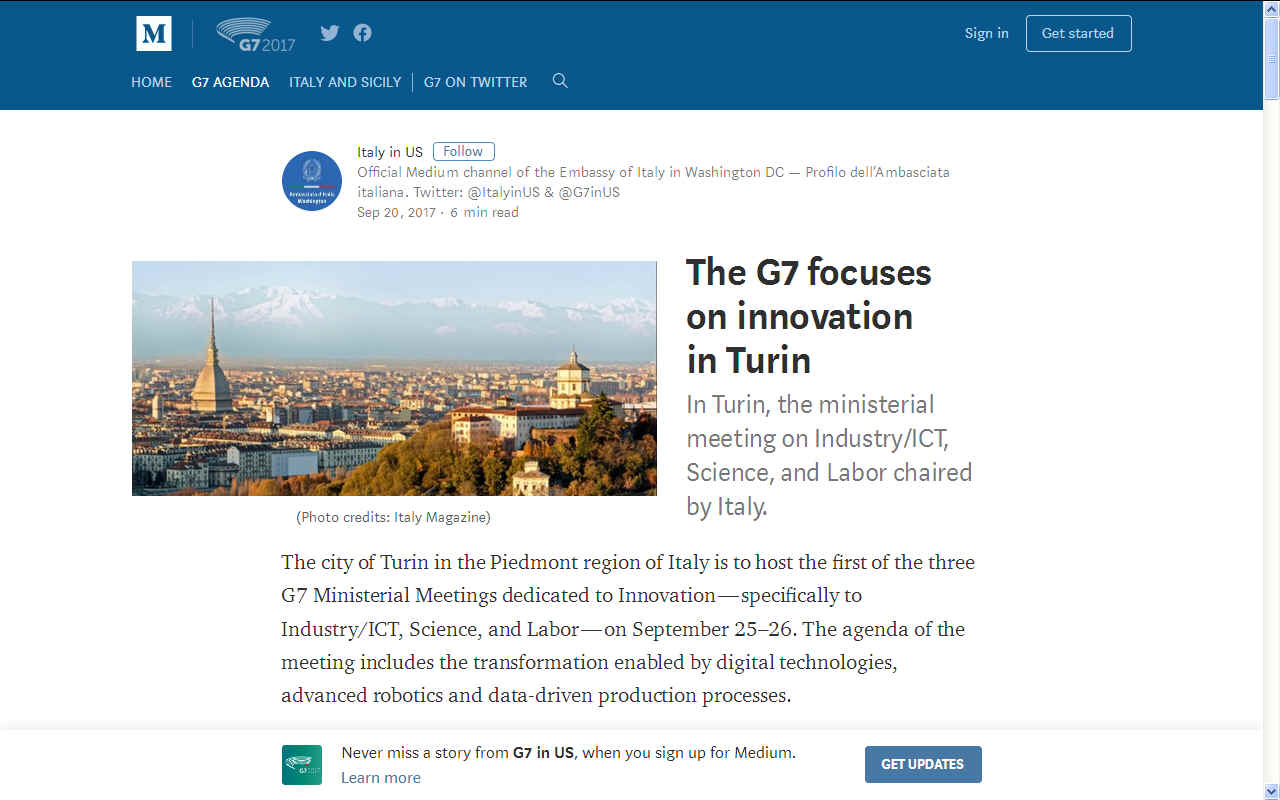
ARTIFICIAL
INTELLIGENCE, BIG DATA & FUTURE OF WORK
On September 25, Turin will also host the first meeting of the “I-7 Innovators’ Strategic Advisory Board on People-Centered Innovation” , the engagement group launched last May during the G7 Summit in Taormina. The group is in charge of providing guidance on emerging innovation issues.
The creation of this group proves Italian G7 Presidency’s attention towards the multiple challenges that innovation poses and that cannot be faced only at national level.
The format of the Advisory Board requires that each G7 country and the EU should appoint a Focal Point who is in charge of selecting up to 5 innovators. Each country and the EU have designated their own group of innovators. Italy Focal Point is Diego Piacentini, Commissioner for the Digital Transformation.
The I-7 Innovators should call governments to action by drawing attention to the gap between the current potential of technological advances and the actual adoption from institutional organizations. The I-7 will also discuss possible measures to mitigate potential downsides of the new technologies.
The meeting will be divided in tree sessions. The first one will focus on the potential of the Artificial Intelligence for governments and citizens.Big Data will be the core theme of the second session, while the third one will deal with the future of work and how new technologies are shaping the employment models.
LABOR
& TECHNOLOGICAL DEVELOPMENTS
One of the main topics of the G7 Ministerial Meeting on Labor
- Turin, September 29–30 - will be the changes on the labor market triggered by technological development. According to the World Economic Forum’s “The Future of Jobs” report published on January 2016, 37% of the leading professional skills will deeply change by 2020 at global level. In Italy this figure rises to 48%, France and Germany stand at 37% and 38%, the United States at 29%, the United Kingdom at 28% and Japan at 25%. In line with these predictions, OECD data show that the percentage of workers using a PC with Internet connection is constantly increasing: 41.1% in Italy, 53.4% in France, 52% in Germany and 55.9 % in the United Kingdom, just to mention data from some G7 countries.
In this framework, the G7 Labor Ministerial Meeting aims to be an opportunity to promote an organic and structured discussion on the impacts of technological transformation on labor market, giving possible responses to manage this phenomenon. One of the main issues that will be addressed is the risk of technological unemployment and the increase of economic inequalities. It is therefore necessary to rethink welfare, investments and social infrastructures, in order to strengthen the social protection networks, providing everyone with a strong welfare system of active and passive employment policies and social security continuity. Finally, specific attention will be paid to the use of new technologies to mitigate the impact of current demographic trends
- in particular population ageing and migration
- on the labor market and social security systems.
Indeed, on these major changes, Italy has already begun a discussion at national level in the Forum “How the Labor is changing” organized last April by the Ministry of Labor, in collaboration with the Ministry of Economic Development, the Ministry of Education, University and Research, and the International Labor Organization (ILO) Office. The Forum has produced a report titled “The Changing Labor. Digitization, automation and the future of work.” This document will surely offer a good starting point to the discussion of the G7 Ministers.
Given the risks but also the opportunities for the Labor market arising from the technological transformation in progress, the G7 governments have a fundamental responsibility in managing these changes by promoting economic and social policies aimed at extending the benefits to an increasing number of citizens. Through this Ministerial Meeting, the Italian Presidency of the G7 and the Ministry of Labor want to give an active contribution to the current debate, trying to give answers and reassurances to the concerns and fears of citizens.
PARTICIPANTS
Valeria Fedeli
John Neil Loughead
Johanna Wanka
Yuko Harayama
Alain Beretz
France Cordova
Kirsty Duncan
Carlos Moedas
TURIN
The Ministerial Meeting was held at the Palace of Venaria Reale, UNESCO World Heritage site located in the metropolitan area of Turin. Ancient Roman city, Italy’s first capital and for decades center of the Italian industry, Turin has been shaped over the centuries by several identities, which significantly marked its historical, architectural and artistic heritage.
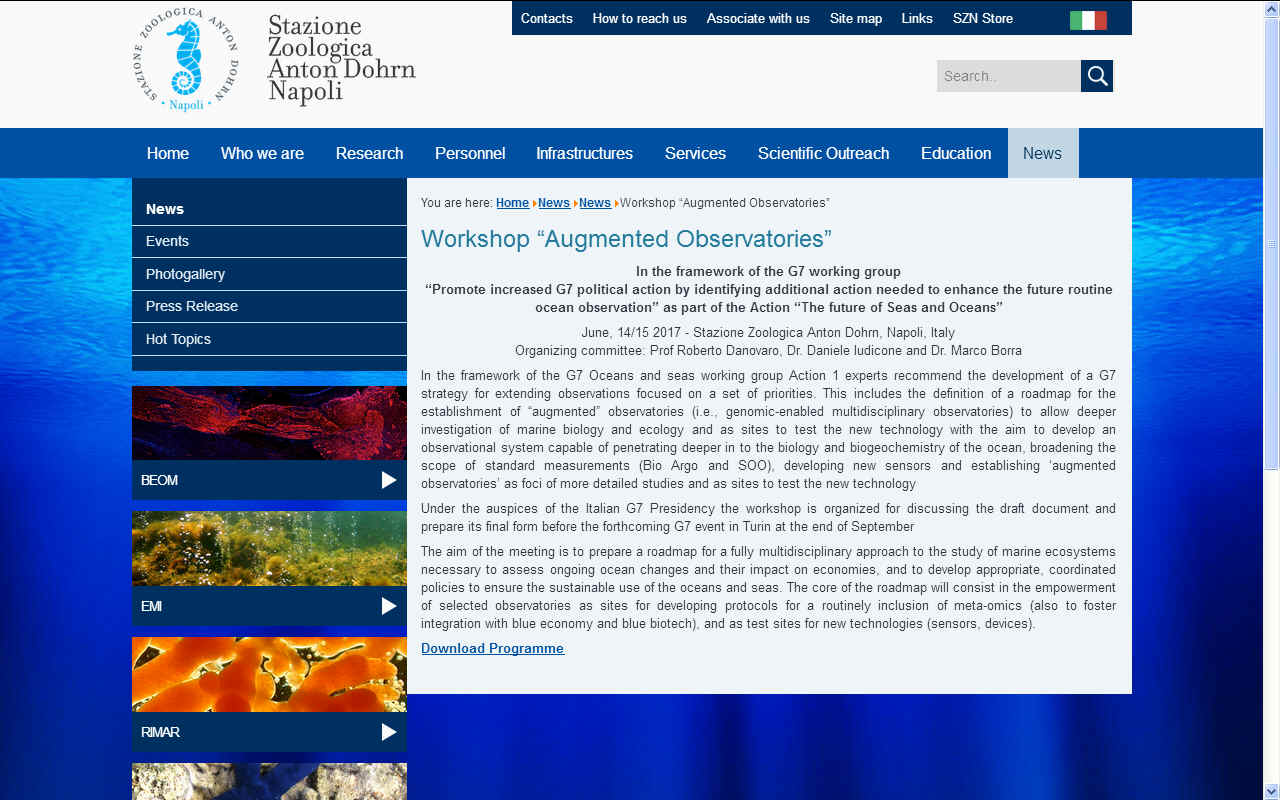
June, 14/15 2017 - Stazione Zoologica Anton
Dohrn, Napoli, Italy - Organizing committee: Prof Roberto
Danovaro, Dr. Daniele Iudicone and Dr. Marco Borra
In the framework of the G7 Oceans and seas working group Action 1 experts recommend the development of a G7 strategy for extending observations focused on a set of priorities. This includes the definition of a roadmap for the establishment of “augmented” observatories (i.e., genomic-enabled multidisciplinary observatories) to allow deeper investigation of marine biology and ecology and as sites to test the new technology with the aim to develop an observational system capable of penetrating deeper in to the biology and biogeochemistry of the ocean, broadening the scope of standard measurements (Bio Argo and
SOO), developing new sensors and establishing ‘augmented observatories’ as foci of more detailed studies and as sites to test the new technology
Under the auspices of the Italian G7 Presidency the workshop is organized for discussing the draft document and prepare its final form before the forthcoming G7 event in Turin at the end of September
The aim of the meeting is to prepare a roadmap for a fully multidisciplinary approach to the study of marine ecosystems necessary to assess ongoing ocean changes and their impact on economies, and to develop appropriate, coordinated policies to ensure the sustainable use of the oceans and seas.
The core of the roadmap will consist in the empowerment of selected observatories as sites for developing protocols for a routinely inclusion of
meta-omics (also to foster integration with blue economy and blue
biotech), and as test sites for new technologies (sensors, devices).
NOC
September 29 2017
This week, the 2017 Ministerial Meeting on Science takes place in Turin,
Italy. Ministers and senior officials from across the G7 congratulated the G7 Future of the Seas and Oceans Working Group on the significant progress it has made since Ministers last met in May 2016.
The Working Group, which is made up of marine scientists and government science ministries from across the G7, is being led by the UK Government’s Department for Business, Energy & Industrial Strategy with the
NOC and NERC playing an integral part in driving forward Working Group activities, with support from the
NOC Association.
Ministers agreed that the work of the group has the potential to lead to a step-change in realising more rapidly and cost-effectively the potential of international ocean science to support achievement of
Sustainable Development Goals
13: Climate Action and 14: Life Below Water, along with others.
As outlined in the newly published G7 Turin Communiqué and annex (an executive summary of the Working Group’s report on progress since May 2016) the Working Group will meet before the end of 2017 to agree action plans that ensure continued strong progress in 2018. The group’s full report, as well as a separate report on progress made by the Working Group’s Action 1 sub-groups can be read on the G7Italy.it website. The executive summary is based on recommendations arising from a pan-G7 workshop hosted by NOC in November last year.
Professor Edward Hill, Executive Director of the National Oceanography Centre said “I am very encouraged to see the tremendous progress made in the G7 Future of the Seas and Ocean initiative and am very pleased that the National Oceanography Centre is playing a key role in supporting this work.”
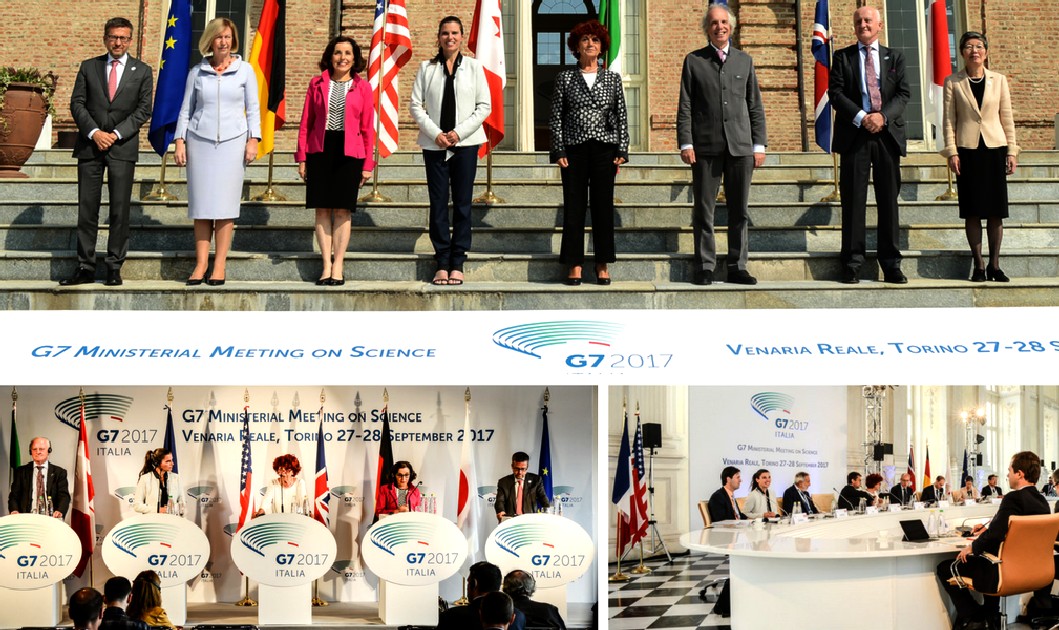
HOW
IT WORKS - The role of chairing the G7 rotates each calendar year among the member countries in the following order: France, United States, United Kingdom, Germany, Japan, Italy and Canada. The European Union is not part of this hosting rotation.
The country holding the G7 presidency is responsible for hosting and organizing the summit. It also organizes a number of ministerial-level preparatory meetings in the lead-up to the main event. The chair sets the agenda for its year and is responsible for speaking on behalf of the G7. The chair also engages non-member countries, non-governmental organizations and international organizations.
The host country organizes several preparatory meetings before the summit. G7 leaders appoint personal representatives, known as Sherpas, to attend these meetings to discuss potential agenda items. The Sherpas, usually high-ranking government officials, communicate directly with each other throughout the year.
MARINE CONSERVATION BLOG - G7 JAPAN MAY 26-27 2016
When leaders of the world’s seven most industrialized nations meet in
Japan May 26-27 their decisions on key issues- such as how to energize a frail
global economy and restrain the spread of terrorism- will likely capture the news headlines.
But the leaders of the United
States, Canada, Japan,
France, the
United
Kingdom, Germany and Italy, known as the Group of Seven (G7), should also consider united efforts to conserve marine biodiversity and the world’s largest natural system –the ocean. After all, the G7 countries control about one-third of the world’s economic output, account for 11% of the global population and produce over 25% of the world’s emissions of
carbon
dioxide. [i] Clearly, what they decide to do in concert- or not -is consequential.
From the frozen seas to the sunlit tropics, estuarine, coastal and oceanic ecosystems are home to millions of marine species. Unfortunately, impacts from human activities such as
overfishing, ocean warming, acidification and pollution are significantly straining the ocean’s capacity to sustain us. As the ocean warms and acidifies, we now risk mass extinction in the seas and large reductions in the important benefits we get from the ocean:
oxygen, seafood and a livable climate.
Marine Conservation Institute and increasing numbers of marine scientists around the world believe that protecting marine life in their ecosystems via strategically placed, fully protected marine reserves is the best way to maintain biological diversity, abundance and resilience of the ocean. The science on marine reserves and how they work to safeguard the ocean is
robust [ii]. And so it is time for the G7 countries to lead the way in establishing more reserves in the ocean to protect this vital system.
The G7 countries are signatories on international conservation agreements that effect the ocean, such as the Convention on Biological Diversity’s Strategic Plan for Biodiversity 2011-2020. This Strategic Plan consists of a biodiversity target, Aichi Target 11, which states that by 2020, 10% of coastal and marine areas will be conserved through effectively managed, ecologically representative and well connected systems of protected areas, and integrated into the wider landscapes and
seascapes. [iii]
With less than four years left to meet this target, and in light of the G7 annual meeting, how are the G7 countries doing on their commitments to protect the ocean? We crunched the numbers with help from MPAtlas.org to see how the G7 compare as leaders in marine conservation. They have the financial means, are they doing their part?
Of the G7 countries, only two have protected more than 1% of their oceans in fully protected reserves. The United States leads with 13.5% of waters fully protected (a number that includes territories and non-continental states) and is followed by the United Kingdom with 9.7% protection. Full protection in the UK will increase to 22% once the Pitcairn Islands Marine Reserve, announced in 2015, is fully
implemented. [iv]
The remaining G7 nations (Italy, Canada, France, Japan, and Germany) have each strongly protected less than 1% of their oceans.
South Africa (4.5%),
Australia (4.1%) and
Saudi Arabia (2.1%) have conserved more ocean than the wealthier members of the G7 by implementing strongly protected reserves.
Given the slow rate of progress of the majority of the G7 countries on establishing fully protected marine reserves, it is heartening to see the G7 environmental ministers recognize their conservation obligations in their joint communique from last week’s preparatory meeting in Japan. They wrote, in part:
“Biodiversity plays a vital role for maintaining life sustaining systems, and therefore is of paramount importance to all
life on Earth including human beings…We recognize that the loss of biodiversity and degradation of ecosystems constitute both an environmental problem, as well as a social-economic problem which reduces human well-being… In order to achieve this, we recognize that important challenges are to take into account the values of biodiversity and ecosystems and their services, to incorporate them, in an appropriate manner, across our economies and policy decision making.
[page 5]
We note the importance of promoting both regional and global efforts to conserve and sustainably use marine biodiversity, inter alia with regard to ocean governance. We also support and will engage constructively in the UN process aimed at the development of an international legally binding instrument under the
United Nations Convention on the Law of the Sea on the conservation and sustainable use of marine biological diversity of areas beyond national jurisdiction.
[page 13]” [v]
Let’s hope that 2016-2020 are years of great progress for ocean protection. Marine Conservation Institute, the
Ocean Sanctuary Alliance and many others are working to help countries achieve the 10% marine protected area target by 2020.
[i]
Federal Statistical Office of Germany. The G7 in Figures; Summit of the G7 States in Elmau 2015. May 2015 https://www.destatis.de/EN/Publications/Specialized/InternationalData/G7InFigures0000155159004.pdf?__blob=publicationFile
[ii] https://blog.marine-conservation.org/2016/04/how-much-is-enough.html
[iii] Convention on Biological Diversity. Aichi Biodiversity Targets. https://www.cbd.int/sp/targets/
[iv] Marine Conservation Institute. SeaStates G20 in 2014; No-take Reserves in the World’s Largest Economies. https://marine-conservation.org/media/filer_public/filer_public/2014/11/17/mci_seastates_g20_2014.pdf
[v] Communiqué from G7 Toyama Environment Ministers’ Meeting Toyama, Japan May 15-16, 2016. http://www.env.go.jp/earth/g7toyama_emm/english/pdf/160516_G7EMM%20Communique_FINAL.pdf
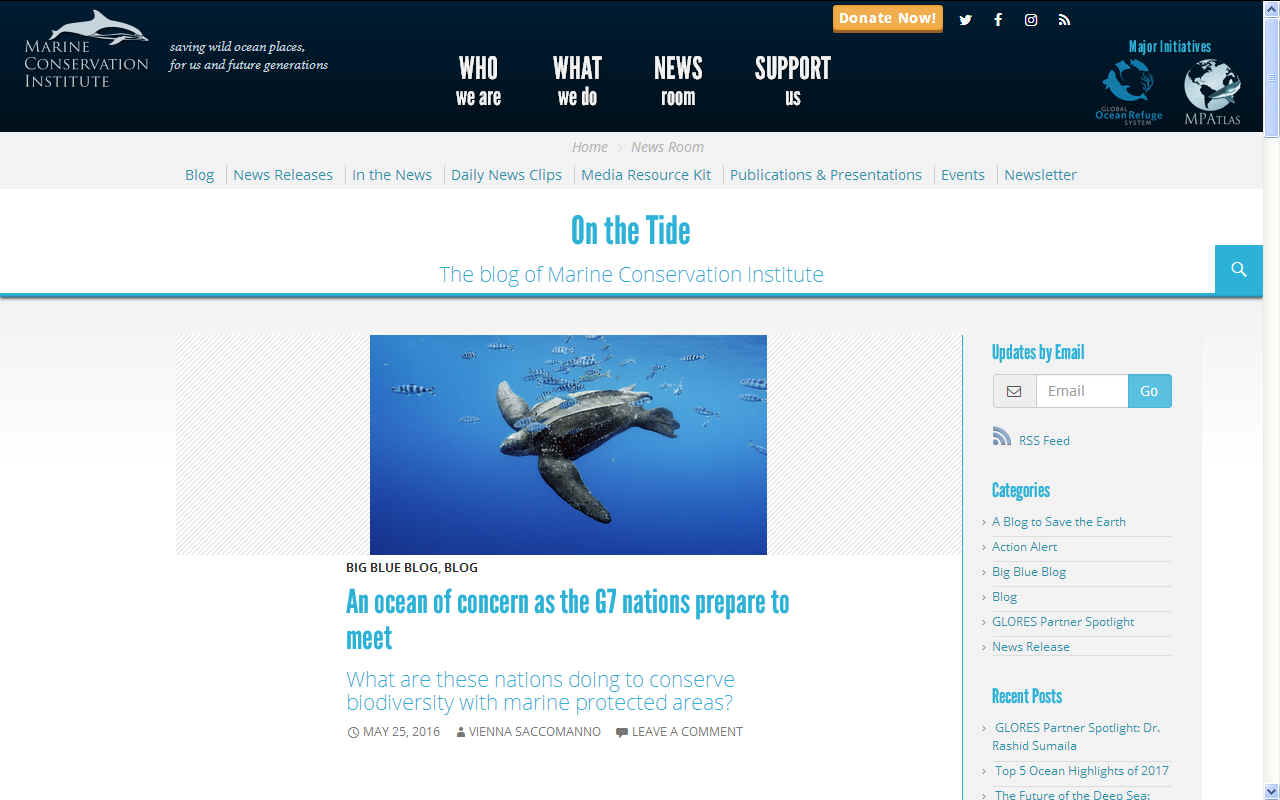
LEADERS
SUMMITS - During the mid-1970s, the global economy was suffering from its first oil shock and the financial crisis which followed. The G7 emerged as a response, first bringing together the five heads of state and government from the leading industrialized nations, France, West Germany, Japan, the United Kingdom and the United States, to discuss international economic policy. Italy was invited by France to join in 1975 and a year later, in 1976, Canada’s Prime Minister was extended an invitation to the G7 by the President of the United States.
In 1997, Russia was invited to join the G7 in recognition of the economic and democratic reforms it had undertaken at the time. Russia formally joined the G7 in 1998, and until 2013 the G7 met as the
G8. In 2014, Russia’s violation of Ukraine’s sovereignty and territorial integrity led to its suspension. As a result, the G8 reverted to the G7.
Today, G7 leaders meet in summit format once a year. Canada will host its sixth G7 Summit in 2018, in the Charlevoix region of
Quebec.
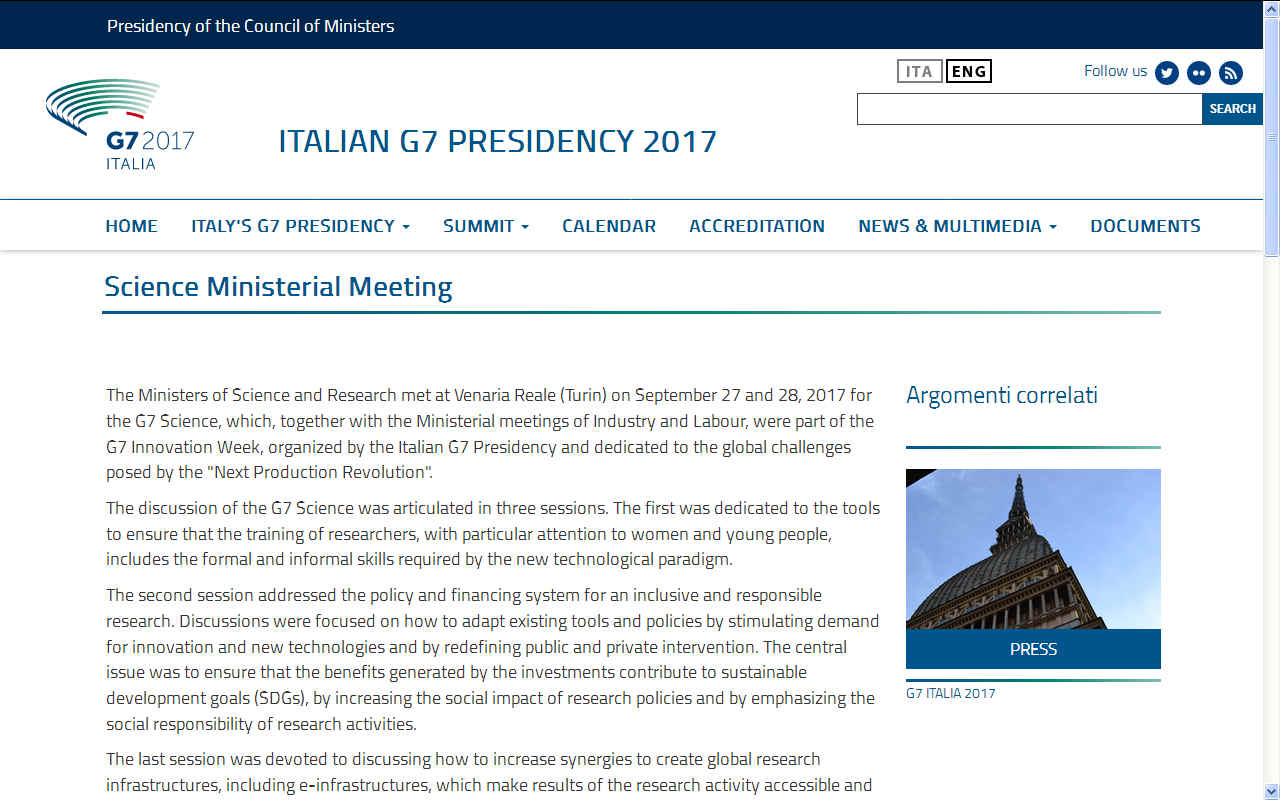
WORKS -
The Gro
CONTACTS
The
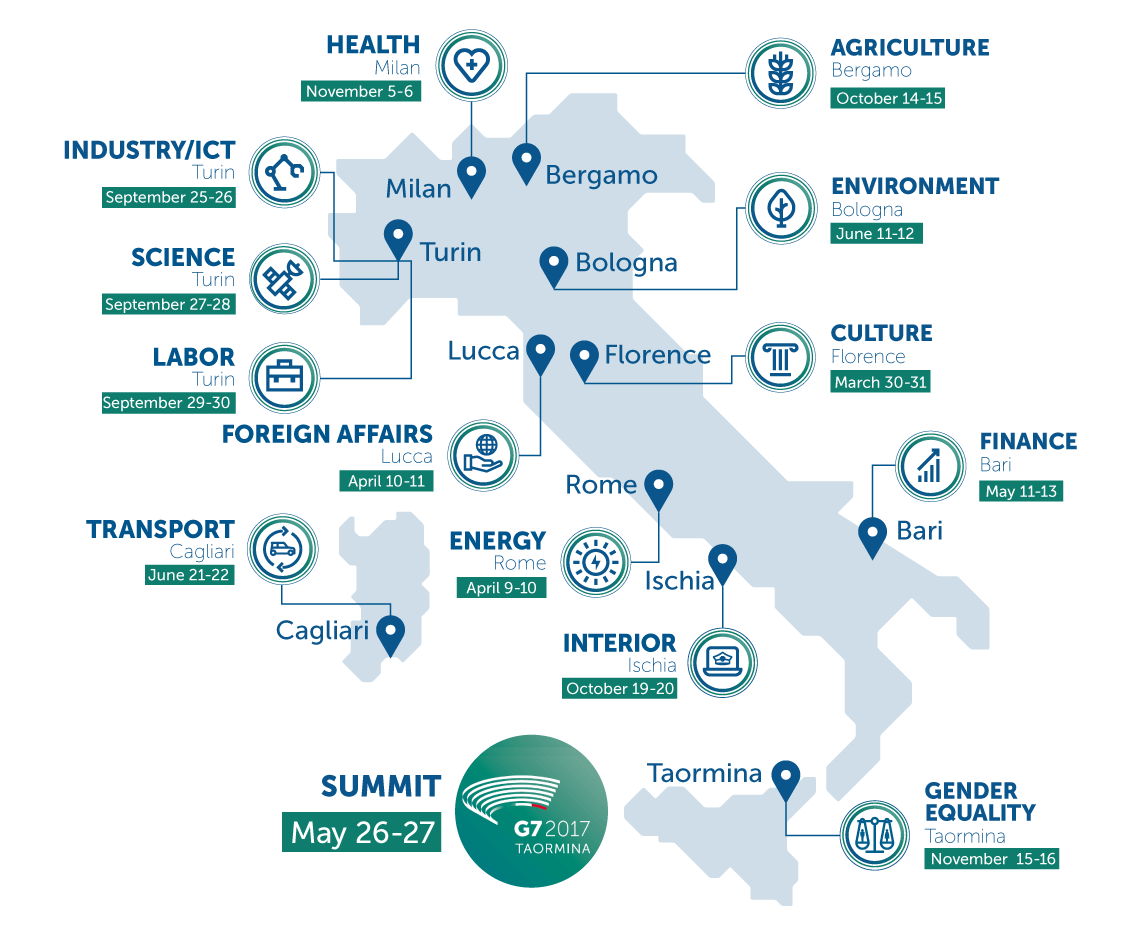
G7/8
SCIENCE and TECHNOLOGY MINISTERS' MEETINGS - September
28-29, 2017, Turin
G7
Science Ministers Communiqué, September 28
Annex
1: G7 Future of the Seas and Oceans Working Group — Progress Since May 2016,
September 28
Annex
2: Report of the Group of Senior Officials on Global Research Infrastructures,
September 28
Annex
3:G7 Working Group Neglected Tropical Diseases and Poverty Related Diseases,
September 28
Annex
4: G7 Expert Group on Open Science, September 28
May
15-17, 2016, Tsukuba, Ibaraki Prefecture, Japan - Communiqué,
May 17
Attachment
1: G7 follow-up workshop on mapping, coordination and joint activities in
the field of NTDs and PRDs, May 17
Attachment
2: Recommendations – G7 expert workshop on future of the oceans and
seas, May 17
October
8/9, 2015, Berlin
- Communiqué
of the G7 Science Ministers, October 9
June
13, 2013, London - Science Ministers' Statement
June
22-24, 2009, Lesmo (Milano), Italy — cancelled (under
the auspices of the Italian Ministry of Education, University and Research)
June
15 2008, Okinawa - Chair's Summary,
June 15 [PDF]
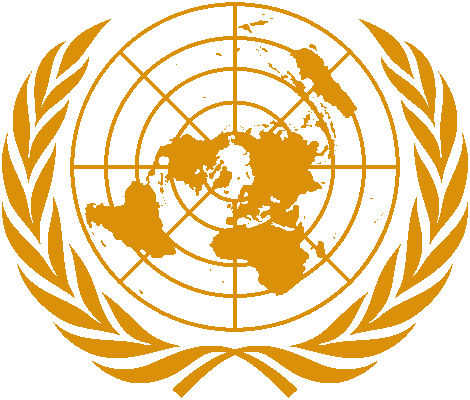 
LINKS
& REFERENCE
https://medium.com/g7inus/the-g7-focuses-on-innovation-in-turin-3b496e979fbb
http://www.szn.it/index.php/en/news/news/2781-workshop-%E2%80%9Caugmented-observatories%E2%80%9D
http://international.gc.ca/world-monde/international_relations-relations_internationales/g7/index.aspx?lang=eng
https://blog.marine-conservation.org/2016/05/g7-ocean-protection.html
http://www.g7italy.it/en/science-ministerial-meeting
http://www.g8.utoronto.ca/science/index.html
http://noc.ac.uk/news/support-g7-science-ministers-future-seas-oceans-working-group
http://www.un.org/climatechange/
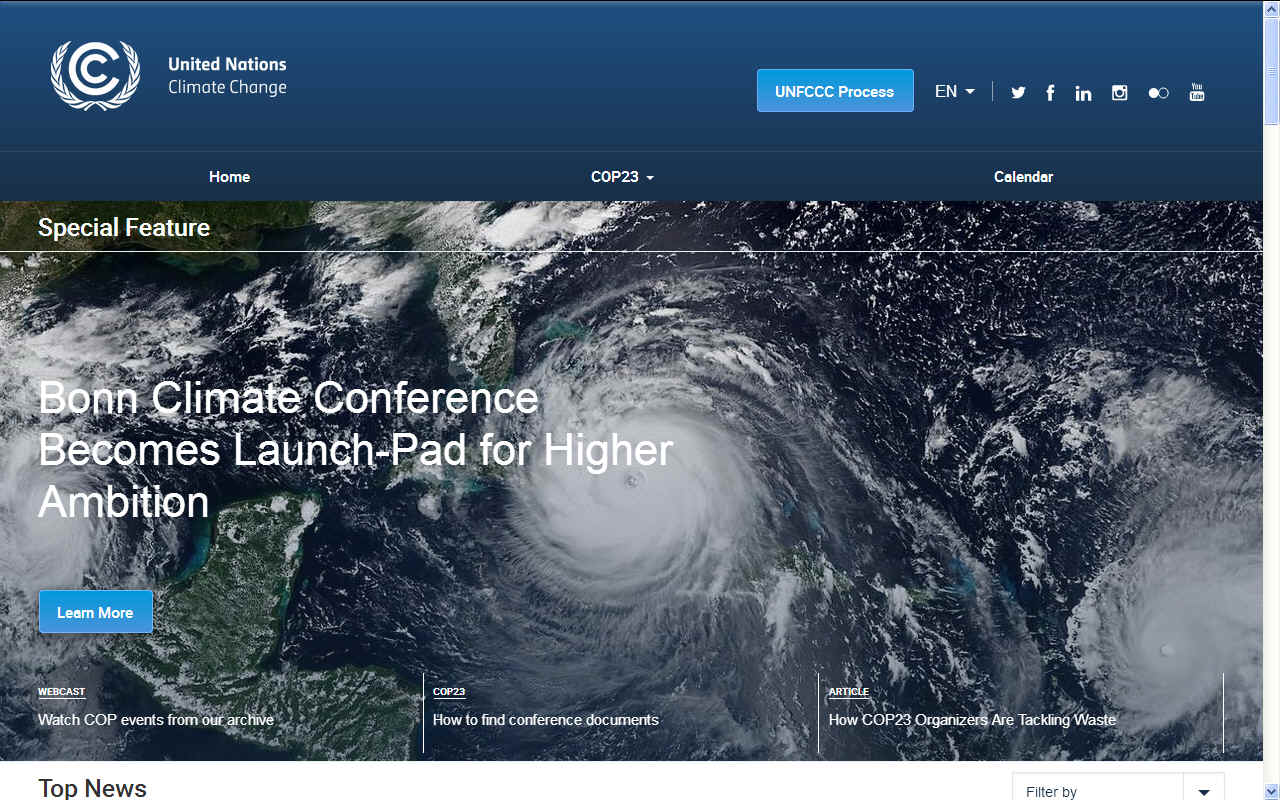
This
website is provided on a free basis as a public information
service. copyright © Cleaner
Oceans Foundation Ltd (COFL) (Company No: 4674774)
2018. Solar
Studios, BN271RF, United Kingdom.
COFL
is a charity without share capital. The names AmphiMax™,
RiverVax™
and SeaVax™
are trade names used under license by COF in connection with their 'Feed
The World' ocean cleaning sustainability campaign.
|









